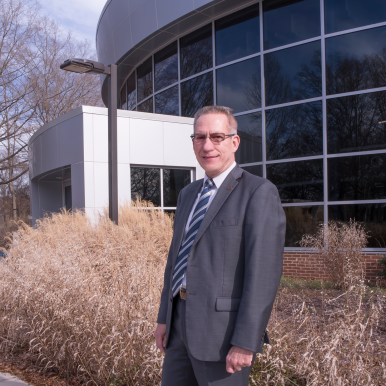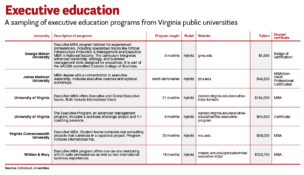Civilian life
Community colleges train veterans for new careers
Paul Bibeau //February 27, 2023//
Paul Valentine is on a winding career path. After leaving the Army more than a decade ago, he got his commercial driver’s license at Blue Ridge Community College in Weyers Cave.
He was taking classes to try to get an engineering degree as well but quit to take full-time work at trucking companies after his wife became pregnant. In 2021, Valentine started school again at Blue Ridge; he tried calculus but switched to business management.
Valentine hopes to earn an associate degree and eventually transfer to a four-year college to get his bachelor’s degree in business administration. He doesn’t know what sector he wants to dive into, but that’s OK with him.
“The community college system here in Virginia is so flexible,” says Valentine. “If you’re struggling in one department, they encourage you to … find something that will fit better for you as an individual.”
In September 2022, the state reached a milestone in its decade-old Virginia Values Veterans (V3) program, when the 100,000th veteran landed a job through the program’s efforts. A free training and certification program for employers, V3 teaches companies best practices for recruiting, hiring and retaining veterans and their family members, who are considered excellent prospects for certain skilled jobs.
Virginia has 700,000 veterans, a higher concentration than most states, and nationwide about 200,000 people leave military service each year. That leaves a readymade workforce — and not just in Hampton Roads, home of the world’s largest naval base. Community colleges across the state have programs to train former military members for civilian jobs, about 300,000 of which are currently unfilled in Virginia. State workforce officials and agencies have been particularly focused on how to encourage these service members to stay and work in Virginia.
“We want these highly trained, skilled and disciplined men and women to find suitable employment here,” Gov. Glenn Youngkin said in a September 2022 statement.
Community building
Shawn Avery, president and CEO of the Hampton Roads Workforce Council, says the key to keeping vets in Virginia is connecting them with education, and community colleges play a major role in that effort.
According to Virginia Community College System (VCCS) data, 26,000 students in the state’s 23 community colleges last year had some military status — including veterans, active-duty and dependents.
That’s about 13% of all community college enrollees. Tidewater Community College and Northern Virginia Community College each had about a quarter of these students, and Germanna and Virginia Peninsula community colleges each had more than 2,000.
Veterans and administrators say community colleges provide a variety of programs to help vets navigate post-military work. The colleges train vets for their first jobs after the service but also assist them in building a long-term career that might look very different from what they did before.
The Hampton Roads Workforce Council has weekly meetings to match vets with V3-certified employers so people leaving the military can find exactly what training they need to land a job right away. Local community colleges provide that training.
“So now you have a live feedback loop directly from the folks who are hiring whether that certification brings value or not,” says Sultan Camp, director of veteran employment centers at HRWC.
The Department of Defense’s SkillBridge program also helps service members link up with apprenticeships or internships during the last few weeks of their time in the military.
Steven Borden, TCC’s Center for Military and Veterans Education director, notes that the SkillBridge program helps vets get jobs such as machinists, digital court reporters or solar power industry workers. Tidewater also has a program aimed at speeding the hiring of former service members as shipyard welders, by helping them obtain certifications while the shipyard background check process takes place. And the college offers eight-week and 16-week truck driving programs that set up graduates to earn about $50,000 annually to start.

Bob Dixon, military liaison and enrollment adviser at Germanna, which has campuses in Culpeper, Orange and Stafford counties and Fredericksburg, helps vets identify and achieve short-term and long-term goals at community colleges.
An Army vet who served for more than 20 years, Dixon explains that “in the military, we talk about campaigns and battles. When someone leaves the service … we kind of help them focus not only on the 10-meter target but the long-term strategy to use training and education, opportunities and resources for the rest of their career or life.”
Something new
Takesha McMiller, director of military and veterans services at NOVA, says that college advisers spend a lot of time asking students whether they want to jump into a civilian job that’s like what they did in the military, or if they want to find a new path. “And to be honest,” she says, “you get a little bit of both.”
For instance, Mitch Benefield, a 20-year Air Force veteran, earned an associate degree in business administration from Rappahannock Community College, but now he’s lining up another degree in general engineering while working at Huntington Ingalls Industries Inc. as a civilian contractor for Langley Air Force Base’s communications directorate.
VCCS’ Credits2Careers online portal makes career strategizing easier for vets, allowing them to load their military occupations and other data into the system to figure out what degrees they’re closest to achieving. “It’s a great tool where they can actually use the information and see what’s going to be the best fit for them academically,” says Emily Jones-Green, the system’s coordinator of credit for prior learning.
Helping veterans shorten their time in college helps reduce costs. Like World War II vets and many others, current veterans receive educational benefits after their service. The Post-9/11 G.I. Bill provides education funding to anyone who was on active duty for 90 days or more after Sept. 10, 2001, with those who serve longer earning more funding. The money can be used to cover tuition, fees and up to $1,000 for books and supplies, and vets can transfer their G.I. Bill benefits to family members.
“It’s a fantastic program,” says Brandie Weaver, assistant director of military and veteran services at Virginia Peninsula Community College in Hampton and James City County. Many vets and their dependents rely on the program for tuition, housing and books, she notes.
Marine Corps veteran Wes Smith says the program covers most of his expenses as a student at Danville Community College, where he trained in the graphic imaging technology program and landed a job at a printing company. Now he’s studying business at the college, with plans to launch his own personal training company.
In addition to V3, the state has the G3 program (formerly promoted as “Get Skilled, Get a Job, Get Ahead”), which provides tuition assistance for any Virginia resident whose family income falls below a certain threshold. They must also enroll in programs for certain industries where workers are in demand, such as early childhood education, health care, information technology, public safety and skilled trades.
Even though the state’s G3 program isn’t just for veterans, it has unique advantages for them, according to Michele Hilts, assistant director of financial aid and veterans affairs at Virginia Western Community College in Roanoke.
“If you’re eligible, [G3] pays 100% of your tuition,” Hilts says, so vets can save their federal benefits for future studies. “Let’s say they want to do welding for a couple of years … and get their certificate. That can be paid for by G3. They won’t touch their [G.I. Bill] benefits. If they decide to come back later [and study something else], then they can use it. That’s probably the biggest advantage to veterans specifically.”
Germanna’s Dixon advises his students to save part of their G.I. Bill funding too, “because I would say to them perhaps 10, 15 years from now, your boss is gonna say, ‘You know, I’d really like to make you a manager if you had a bachelor’s degree.’”
Community colleges are ideal for this kind of experimentation, says Don Stowers, New River Community College’s veterans officer. Vets can earn several degrees and certificates affordably and without investing too much time, which encourages them to stay and work in Virginia. “The beauty of a community college,” he says, “is that there’s something for everyone.”
S

















